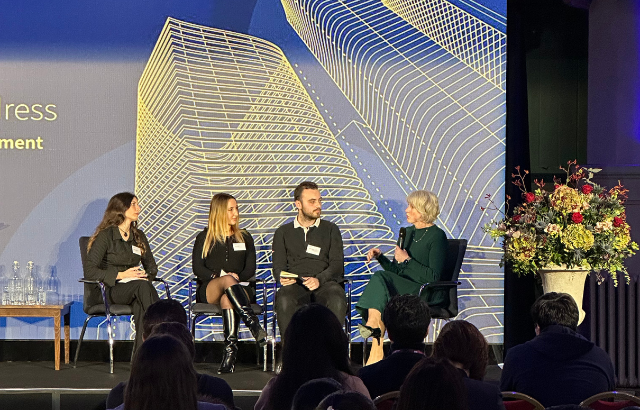Queen Mary diversity experts feature in BBC social mobility film
The latest episode of BBC docuseries ‘How to Crack the Class Ceiling’ features Queen Mary experts on equality, diversity and inclusion sharing research insights to help young working-class people trying to secure prestigious jobs.

BBC presenter Amol Rajan is asking how much background matters in Britain's elite professions – and the answer he gets from Dr Louise Ashley in Queen Mary’s School of Business and Management is that it’s a lot, despite how many firms have launched EDI programmes and claim to make top jobs accessible for anyone with enough talent.
In most elite industries, there’s now pressure to make culture and hiring practices more open to working class candidates. To explore how this plays out, Amol met IHSS Fellow Dr Louise Ashley, who spent a decade researching how the financial industry thinks about social class. She explained how diversity schemes mean the City can look inclusive while its actual practices remain exclusive, which Amal termed “class-washing: pretending to be interested in working-class people as a PR exercise”.
“Over the last 30 or 40 years, we saw a ‘meritocratic’ narrative developing in the City: the idea that jobs were opening up to a much more diverse demographic, who were getting in on the basis of merit alone, technical skills and competencies,” Dr Ashley said. “That narrative has been important for the City’s sense of self and its legitimacy, because if you’re earning a lot you need to convince people you’re worth that money and it’s fair. You can say: ‘we have all these rewards because we’re the best of the best and we deserve it’. But at the same time, the City has been characterised by highly exclusive recruitment practices. Image is very important, partly in relation to status and prestige, and that plays into hiring and recruitment decisions.”
For her new book, ‘Highly Discriminating’, Dr Ashley conducted over 400 anonymous interviews with people either working in the City or trying to get in. One hedge fund manager told her quite plainly: “Basically, we give the top jobs to other posh people, who are our mates.”
A FTSE 100 firm senior leader said: “We all know that people with the right accent and mannerisms can sound much more believable. I want to say we can see through that, but the truth is we can’t.” A junior asset manager explained: “My manager’s much more comfortable putting me in front of other areas of the business than he is putting my colleague who’s got a very Essex accent; he doesn’t get to talk much because of exactly that. It’s not who knows more or whatever, it’s just that people trust you more if you’re from that sort of background.”
Young people featured in the film share similar stories to those in Dr Ashley’s book. Adnan wonders whether to talk about his background in finance interviews, while solicitor Paige wants to become a barrister but has never met one who looks and sounds like her, and Seth fears the media industry doesn’t want to hire white working-class people like him.
While Amol acknowledged the business logic of hiring people who “speak with a certain confidence and polish”, he also lamented how often these qualities are associated with a private education and privileged upbringing. Dr Ashley agreed: “It’s difficult to tell young people that these things are going to make a difference, because it can undermine your sense of self if you’re working in these organisations – but it is really important, because it makes these cultures much more difficult to navigate for the young people who are struggling and hoping to get in.”
Dr Ashley told Amol: “We hear so much about the business case in favour of diversity - the idea that if you recruit and promote on the basis of diversity, if you create more inclusive organisations, then you’ll have more creative solutions for clients - and that business case exists, absolutely. But there is this alternative business case, which is much less explicit, under the surface, where there are clear commercial advantages in exclusivity.
“Exclusivity can persuade external audiences that you’re ‘high-status’. We tend to read expertise and authority from the embodied identity of the person giving it – and, in our society, we’re most likely to associate expertise and authority with a white middle-class man. That doesn’t mean people in these organisations aren’t passionate about social mobility, they believe in it, but there’s a gap between individual passion and institutional action.”
This episode also sees Amol trying to close that gap in his own institution, meeting with BBC director general Tim Davie to challenge him on the broadcaster’s role in these issues, having learned from Queen Mary linguistics researchers how the lack of working-class voices in the media can fuel bias in society.
Watch ‘How to Crack the Class Ceiling’ featuring Queen Mary’s Dr Louise Ashley, Prof Devyani Sharma and Prof Erez Levon on BBC2 at 9pm tonight (Tuesday 13 December 2022) or catch up any time on BBC iPlayer.
Related items

29 November 2024

12 November 2024
